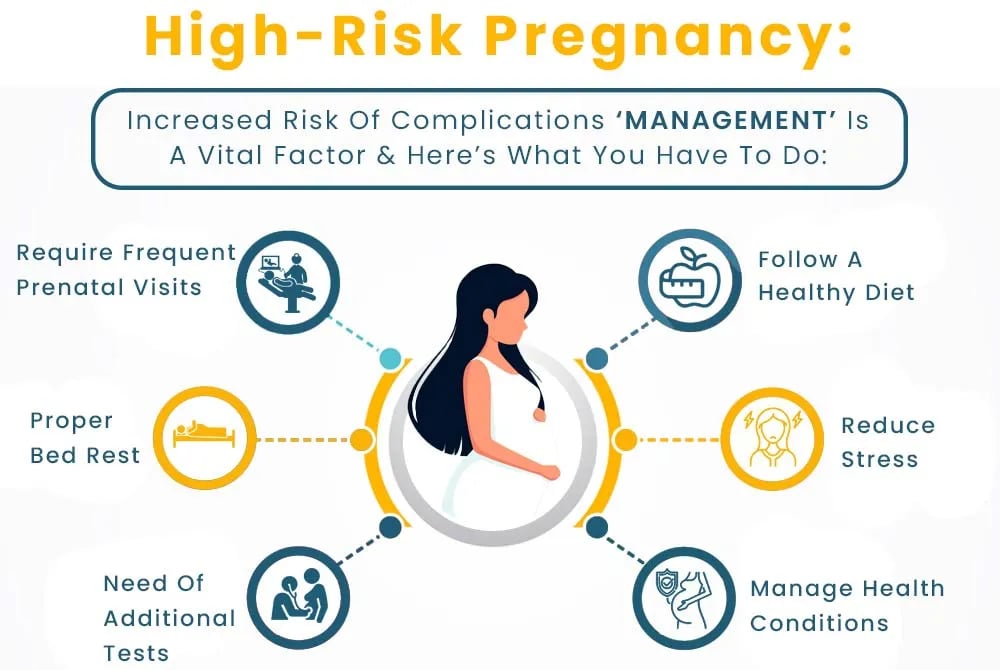Managing High Risk Pregnancy: Stress, Diabetes & More
Learn about high risk pregnancy factors such as age, stress, diabetes, and high blood pressure. Discover tips for managing a high risk pregnancy, especially when expecting twins.
11/10/20241 min read


Understanding High-Risk Pregnancy
A high-risk pregnancy is one where the health of the mother, the baby, or both is at increased risk due to various factors. This type of pregnancy requires special care and monitoring to ensure the best possible outcome for both mother and baby1. Here's a detailed look at what high-risk pregnancy entails, its causes, and how it can be managed.
What is High-Risk Pregnancy?
High-risk pregnancy refers to any pregnancy that comes with increased health risks for either the pregnant parent, the fetus, or both. These risks can arise from pre-existing medical conditions, complications that develop during pregnancy, or factors related to the parent's age and lifestyle1.
Causes of High-Risk Pregnancy
Age: Pregnancies in women younger than 20 or older than 35 are considered high-risk.
Medical Conditions: Conditions like high blood pressure, diabetes, heart disease, and thyroid disorders can complicate pregnancy.
Lifestyle Choices: Smoking, alcohol consumption, drug use, and exposure to environmental toxins can increase risks.
Pregnancy Complications: Conditions like preeclampsia, gestational diabetes, and placenta previa can pose significant risks.
Previous Pregnancy Issues: A history of preterm delivery, miscarriage, or stillbirth can increase the risk of complications in subsequent pregnancies.
Managing High-Risk Pregnancy
Managing a high-risk pregnancy involves close monitoring and specialized care from healthcare providers trained in managing these conditions. This may include more frequent medical appointments, specialized tests, and sometimes hospitalization2. The goal is to manage any complications and ensure the best possible outcome for both the mother and the baby.
Conclusion
While a high-risk pregnancy can be daunting, it's important to remember that with the right care and support, many women with high-risk pregnancies go on to have healthy babies. Consulting with a healthcare provider who specializes in high-risk pregnancies can provide personalized guidance and increase the chances of a successful outcome.
उच्च जोखिम वाली गर्भावस्था को समझना
उच्च जोखिम वाली गर्भावस्था वह होती है जिसमें मां, शिशु, या दोनों की स्वास्थ्य स्थितियों के कारण अधिक खतरे होते हैं। इस प्रकार की गर्भावस्था को विशेष देखभाल और निगरानी की आवश्यकता होती है ताकि मां और शिशु दोनों के लिए सबसे अच्छा परिणाम सुनिश्चित हो सके। यहां हम उच्च जोखिम वाली गर्भावस्था के बारे में, इसके कारणों और इसे कैसे प्रबंधित किया जा सकता है, के बारे में विस्तार से जानकारी प्रदान कर रहे हैं।
उच्च जोखिम वाली गर्भावस्था क्या है?
उच्च जोखिम वाली गर्भावस्था से तात्पर्य ऐसी किसी भी गर्भावस्था से है जिसमें गर्भवती महिला, भ्रूण, या दोनों के स्वास्थ्य के लिए बढ़े हुए जोखिम होते हैं। ये जोखिम पहले से मौजूद चिकित्सा स्थितियों, गर्भावस्था के दौरान उत्पन्न होने वाली जटिलताओं, या माता-पिता की आयु और जीवनशैली से संबंधित हो सकते हैं।
उच्च जोखिम वाली गर्भावस्था के कारण
आयु: 20 वर्ष से कम या 35 वर्ष से अधिक आयु में होने वाली गर्भावस्थाएं उच्च जोखिम वाली मानी जाती हैं।
चिकित्सीय स्थितियां: उच्च रक्तचाप, मधुमेह, हृदय रोग और थायरॉइड विकार जैसी स्थितियां गर्भावस्था को जटिल बना सकती हैं।
जीवनशैली विकल्प: धूम्रपान, शराब का सेवन, मादक द्रव्यों का सेवन और पर्यावरणीय विषाक्त पदार्थों के संपर्क में आना जोखिम को बढ़ा सकते हैं।
गर्भावस्था की जटिलताएं: प्रीक्लेम्प्सिया, गर्भावधि मधुमेह और प्लेसेंटा प्रेविया जैसी स्थितियां महत्वपूर्ण जोखिम पैदा कर सकती हैं।
पिछली गर्भावस्था के मुद्दे: समय से पहले प्रसव, गर्भपात, या मृत जन्म का इतिहास अगली गर्भावस्थाओं में जटिलताओं के जोखिम को बढ़ा सकता है।
उच्च जोखिम वाली गर्भावस्था का प्रबंधन
उच्च जोखिम वाली गर्भावस्था के प्रबंधन में विशेष प्रशिक्षित स्वास्थ्य सेवा प्रदाताओं से निकट निगरानी और विशेष देखभाल की आवश्यकता होती है। इसमें अधिक बार चिकित्सा अपॉइंटमेंट, विशेष परीक्षण और कभी-कभी अस्पताल में भर्ती शामिल हो सकते हैं। उद्देश्य किसी भी जटिलता का प्रबंधन करना और मां और शिशु दोनों के लिए सबसे अच्छा परिणाम सुनिश्चित करना है।
निष्कर्ष
हालांकि उच्च जोखिम वाली गर्भावस्था को संभालना कठिन हो सकता है, यह याद रखना महत्वपूर्ण है कि सही देखभाल और समर्थन के साथ, उच्च जोखिम वाली गर्भावस्था वाली कई महिलाएं स्वस्थ शिशुओं को जन्म देती हैं। उच्च जोखिम वाली गर्भावस्थाओं में विशेषज्ञता रखने वाले स्वास्थ्य सेवा प्रदाता से परामर्श करके व्यक्तिगत मार्गदर्शन प्राप्त किया जा सकता है और सफल परिणाम की संभावनाएं बढ़ सकती हैं।
